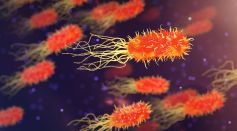Tags: Bacteria

Is Plant Farming on Mars Possible? Clover in Regolith Soil Develops Through Nitrogen-Fixing Bacteria

Aging and Longevity: How Human Gut Microbiome Plays a Vital Role in Increasing Your Lifespan

Micro-Robotic Swimmers Inspired by Bacteria, Sperm Cells Could One Day Be Used For Targeted Drug Delivery
Phytoplasma Bacteria Knows How to Parasitize Plants; Slows Age Development and Turn Into 'Zombies'

Crop Plant Resiliency Using Energy Conversion Found During Photosynthesis; May Develop Immunity from Stress, Bacteria
Superbugs Overcome Drugs Normally Used Against Them; May Help in Developing Evolutionary Medicine to Prevent Antibiotic Resistance
New Renewable Energy Source Discovered in Bacteria; Tiny Biofuel Provider Probably Existed Before Life on Earth
Microorganisms Hidden in Passion Fruit Seeds Found Beneficial Rather Than Harmful; New Study Reveals Bacteria’s Help in Germination, Growth, and Defense

Saving Coastline Fortresses: Probiotics Boost Coral Health; Bacteria Prevent Mortality From Heat Stress

New Antibacterial Technique for Surgical Implants Innovated Through Graphene and Acid Binding
Invasive Insect Extermination: Study Finds Nematode Bacteria as Effective Pesticide Against Fire Ants
Copper Atoms Kept Closer to Combat Bacteria, New Approach Shown in Study

Seafood and Plastics: How Microplastic Pollution Acts as 'Trojan Horse' to Marine Life and Ecology

How Dirty Are Our Beds? A Microbiologist Explains How Germs Live on Mattresses
'Harmless' Bacteria in Nose Drops Elicits Immune Response Against Deadly Brain Disease

Mars Methane Detections: Are Scientists Ready to Explain These Occurrences on the Red Planet?

3D Printed Device Set to Alleviate Bacteria That Causes Middle Ear Infection
Legionnaires' Disease Outbreak in North Portland Apartment Remains a Mystery

New Bacteria Study Tracks Early Human Migration From Siberia Into the Americas
New Bacterium Nearly Absent in Obese, Diabetic People But Found in Healthy Individuals
Most Popular

Largest Known Volcanic Aquifer Discovered Beneath Oregon's Cascades

New 'Supergiant' Sea Bug Found in South China Sea, Named After Darth Vader

Mediterranean Sea Was Refilled by a Catastrophic Flood Millions of Years Ago

Mysterious Cosmic Waves That Sound Like Birds Detected in Unexpected Space Region





